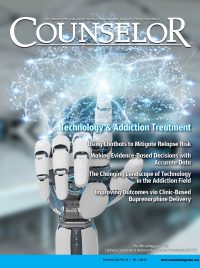Share
This column focuses on applications of Twelve Step principles in coping with the ongoing COVID-19 pandemic. As of this writing, daily case numbers are again spiking, with experts predicting a particularly heavy caseload throughout the winter. Hopefully by the time you read this the majority of people will be vaccinated and receiving booster doses, especially health care workers; essential employees such as grocery workers, who are at elevated risk due to ongoing customer contact; and the elderly, particularly those with preexisting conditions such as advanced heart disease and serious respiratory problems that pose heavy risks concerning the consequences of COVID.
Additionally, by the time you read this ideally our nation’s administration will fully respect science and will vigorously promote the paramount importance of always following the sound precautionary measures that infectious disease experts have vociferously advocated since day one. These measures include wearing masks in public, maintaining appropriate physical distancing, engaging in frequent hand washing, and assigning a high priority to effective case finding, contact tracing, and enforced quarantine of all persons testing positive.
The Application of Twelve Step Principles
As we have been struggling with COVID-19 for some time now, we are overwhelmed by the cumulative repercussions of this ongoing pandemic. Major stress-inducing repercussions include:
- Constant fear of exposure to a deadly disease with an incredibly high death rate; our nation’s death toll is currently close to 960,000 (Ritchie et al., 2022). Significantly, the death count reflects glaring inequities in access to quality health care—death rates among blacks, Hispanics, and other largely underprivileged ethnic minorities are disproportionately high (CDC, 2020).
- Mass public confusion, misunderstanding, and distrust as a consequence of prior leadership at the national level that eschews the science, minimizes the magnitude of the problem, ridicules wearing masks, and incessantly conducts political rallies drawing large crowds of predominantly mask-less attendees packed together shoulder to shoulder.
- Severe individual and family financial hardship as well as major damage to large segments of the economy. The most recent data available indicates a February 2022 unemployment rate of 3.8 percent with 6.3 million workers unemployed (Bureau of Labor Statistics, 2022). Major aversely impacted economic sectors include retail outlets and the restaurant industry.
As an addiction professional who has worked in and around Twelve-Step-based programs for several decades, I believe that during these troublesome times it behooves us to deepen our faith in a beneficent higher power and to draw upon that power as a source of unlimited wisdom and compassion. It is a constantly available resource to guide us in developing the qualities of resiliency and equanimity needed to see us through these difficult times.
In that spirit, the remainder of this column will be devoted to exploring the application of specific Twelve Step principles to empower us in effectively coping with the pandemic. Please note that modified or abbreviated versions may be employed in discussing some of the Steps.
Steps Two and Eleven
- Step Two: “Came to believe that a power greater than ourselves could restore us to sanity” (AA World Services, 1952).
- Step Eleven: “Sought through prayer and meditation to improve our conscious contact with God as we understood Him, praying only for knowledge of His will for us and the power to carry that out” (AA World Services, 1952).
The paragraph I employed to introduce this discussion essentially reflects these two Steps combined. The tendency to go off the rocker from time to time that we all share is dramatically exacerbated by the day-to-day stress overload associated with this deadly virus. That being the case, I believe it is helpful to pause several times throughout each day, remind ourselves we are not in charge, and to humbly turn our excessive stress and obsessions over to our higher power. It is also wise to keep in mind the divine wisdom inherent in the Serenity Prayer.
Steps Four and Nine
- Step Four: “Made a searching and fearless moral inventory of ourselves” (AA World Services, 1952).
- Step Nine: “Made direct amends to such people wherever possible, except when to do so would injure them or others” (AA World Services, 1952).
As at times we all find ourselves navigating this protracted crisis with frayed nerves, it becomes easy to lapse into abusive behavior and communications in our interactions with those around us. To break out of this cycle, it might be wise to take a daily moral inventory to guide us to promptly and sincerely make amends to those we have inadvertently harmed.
Step Twelve
- Step Twelve: “Having had a spiritual awakening as a result of these Steps, we tried to carry this message to alcoholics, and to practice these principles in all our affairs” (AA World Services, 1952).
- Step Twelve (modified): “Having had a spiritual awakening as a result of these Steps, we attempt to reach out to others experiencing hardship as a result of this pandemic and lend a helping hand.”
I view the modified version as a natural extension of the spirit of compassionately reaching out to others as embodied in Step Twelve. It is truly in keeping with the spirit and traditions of all Twelve Step recovery programs to extend a loving hand to those who are less fortunate than ourselves. In the midst of this overwhelming crisis, it behooves us to compassionately focus on those around us who are experiencing particularly heavy misfortune wrought by this terrible disease and its ramifications, and extend a heartfelt and loving hand.
Conclusion
As I stated in a previous column, I firmly believe that recovering alcoholics and/or addicts with a track record of sustained sobriety, and who are conscientiously working their programs, are in a good position to withstand the pandemic while also making substantial contributions toward resolving the myriad related problems that will most certainly lie ahead.
Before leaving this discussion of applying specific Steps of recovery to the crisis at hand, I want to remind counselors and therapists working with substance abuse clients to be on the lookout for possible relapse triggers brought about by this pandemic that may adversely impact your clients. When you observe red flags occurring, be sure to take proactive steps to safeguard against relapse.
I hope that readers find this discourse on the application of Twelve Step principles in navigating the many trials posed by the COVID-19 pandemic to be of help. While I have attempted to portray specific applications of various steps, no doubt you can identify additional applications I have missed. When I reflect on what lessons I need to learn from this challenging situation, the word “interdependence” invariably comes to mind. What lessons come to your mind and what personal meaning do they convey to you?
Stay well, stay strong, and keep your spirits up. Until next time—to your health!
References
- Alcoholics Anonymous World Services. (1952). Twelve steps and twelve traditions. New York, NY: Author.
- Centers for Disease Control and Prevention (CDC). (2020). Risk of severe illness or death from COVID-19: Racial and ethnic health disparities. Retrieved from https://www.cdc.gov/coronavirus/2019-ncov/community/health-equity/racial-ethnic-disparities/disparities-illness.html
- Bureau of Labor Statistics. (2022). The employment situation – February 2022. Retrieved from https://www.dol.gov/newsroom/economicdata/empsit_10022020.pdf
- Ritchie, H., Mathieu, E., Rodes-Guirao, L., Appel, C., Giattino, C., Ortiz-Ospina, E., Hasell, J., Macdonald, B., Dattani, S., & Roser, M. (2022). Coronavirus (COVID-19) deaths. Retrieved from https://ourworldindata.org/covid-deaths?country=~USA#what-is-the-cumulative-number-of-confirmed-deaths
About Me
John Newport, PhD, is an addiction specialist, writer, and speaker living in Tucson, Arizona. He is the author of The Wellness-Recovery Connection: Charting Your Pathway to Optimal Health While Recovering from Alcoholism and Drug Addiction (2004). He is available for workshops, conference presentations, and staff trainings on all aspects of wellness and recovery, as well as for personal wellness and recovery coaching by phone. He can be reached at healingtucson@hotmail.com.













 Counselor Magazine is the official publication of the California Association of Addiction Programs and Professionals (CCAPP). Counselor offers online continuing education, article archives, subscription deals, and article submission guidelines. It has been serving the addiction field for more than thirty years.
Counselor Magazine is the official publication of the California Association of Addiction Programs and Professionals (CCAPP). Counselor offers online continuing education, article archives, subscription deals, and article submission guidelines. It has been serving the addiction field for more than thirty years.